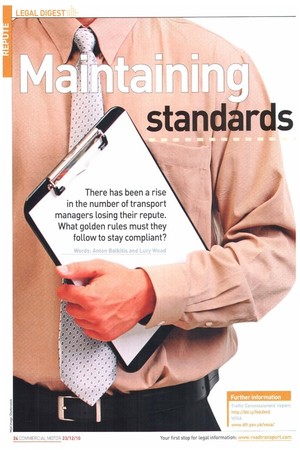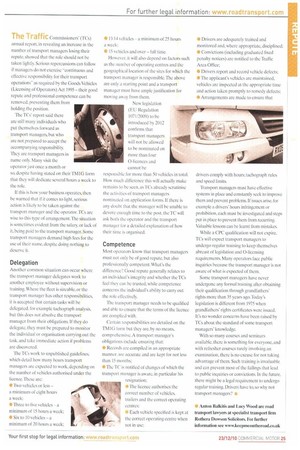stan0; rds
Page 24

Page 25

If you've noticed an error in this article please click here to report it so we can fix it.
The Traffic Commissioners' (TCs) annual report, in revealing an increase in the number of transport managers losing their repute, showed that the role should not be taken lightly. Serious repercussions can follow if managers do not exercise "continuous and effective responsibility for their transport operations'. as required by the Goods Vehicles (Licensing of Operators) Act 1995their good repute and professional competence can be removed, preventing them from holding the position.
The TCs' report said there are still many individuals who put themselves forward as transport managers, but who are not prepared to accept the accompanying responsibility. They are transport managers in name only. Many visit the operator just once a month or so, despite having stated on their TM1G form that they will dedicate several hours a week to the role.
If this is how your business operates, then be warned that if it comes to light, serious action is likely to be taken against the transport manager and the operator. TCs are wise to this type of arrangement.The situation is sometimes evident from the salary, or lack of it, being paid to the transport manager. Some transport managers demand high fees for the use of their name, despite doing nothing to deserve it.
Delegation
Another common situation can occur where the transport manager delegates work to another employee without supervision or training. Where the fleet is sizeable, or the transport manager has other responsibilities, it is accepted that certain tasks will be delegated, for example tachograph analysis, but this does not absolve the transport manager from their obligations. If they do delegate, they must be prepared to monitor the individual or organisation carrying out the task. and take immediate action if problems are discovered.
The TCs work to unpublished guidelines, which detail how many hours transport managers are expected to work, depending on the number of vehicles authorised under the licence. These arc: • Two vehicles or less a minimum of eight hours a week: • Three to five vehicles a minimum of 15 hours a week; • Six to 10 vehicles a minimum of 20 hours a week; • 11-14 vehicles a minimum of 25 hours a week: • 15 vehicles and over-full time.
However, it will also depend on factors such as the number of operating centres and the geographical location of the sites for which the transport manager is responsible.The above are only a starting point and a transport manager must have ample justification for moving away from them.
New legislation (ELI Regulation 1071/2009) to be introduced by 2012 confirms that transport managers will not be allowed to he nominated on more than four 0-licences and cannot be responsible for more than 50 vehicles in total. How much difference this will actually make remains to be seen, as TCs already scrutinise the activities of transport managers nominated on application forms. If there is any doubt that the manager will be unable to devote enough time to the post. the TC will ask both the operator and the transport manager for a detailed explanation of how their time is organised.
Competence
Most operators know that transport managers must not only be of good repute, but also professionally competent. What's the difference? Good repute generally relates to an individual's integrity and whether the TCs feel they can be trusted, while competence concerns the individual's ability to carry out the role effectively.
The transport manager needs to be qualified and able to ensure that the terms of the licence are complied with.
Certain responsibilities are detailed on the TM1G form but they are, by no means, comprehensive. A transport manager's obligations include ensuring that: • Records are compiled in an appropriate manner, are accurate and arc kept for not less than 15 months; • The TC is notified of changes of which the transport manager is aware, in particular his resignation; The licence authorises the correct number of vehicles, trailers and the correct operating centres: Each vehicle specified is kept at the correct operating centre when not in use; Drivers are adequately trained and monitored and, where appropriate, disciplined; • Convictions (including graduated fixed penalty notices) are notified to the Traffic Area Office; • Drivers report and record vehicle defects;
• The applicant's vehicles are maintained, vehicles are inspected at the appropriate time and action taken promptly to remedy defects; a Arrangements are made to ensure that
drivers comply with hours: tachograph rules and speed limits.
Transport managers must have effective systems in place and constantly seek to improve them and prevent problems. If issues arise, for example a drivers' hours infringement or prohibition,each must be investigated and steps put in place to prevent them from recurring. Valuable lessons can be learnt from mistakes While a CPC qualification will not expire, TCs will expect transport managers to undergo regular training to keep themselves abreast of legislation and 0-licensing requirements. Many operators face public inquiries because the transport manager is not aware of what is expected of them.
Some transport managers have never undergone any formal training after obtaining their qualification through grandfathers' rights more than 35 years ago. Today's legislation is different from 1975 when grandfathers' rights certificates were issued. It's no wonder concerns have been raised by TCs about the standard of some transport managers' knowledge.
With so many courses and seminars available, there is something for everyone, and with refresher courses rarely involving an examination, there is no excuse for not taking advantage of them. Such training is invaluable and can prevent most of the failings that lead to public inquiries or convictions. In the future, there might be a legal requirement to undergo regular training. Drivers have to, so why not transport managers'? tit
a Anton Ralkitis and Lucy Wood are road transport lawyers at specialist transport firm Rothera Dowson Solicitors. For further information see www.keepmeontheroad.co.uk
































































































































